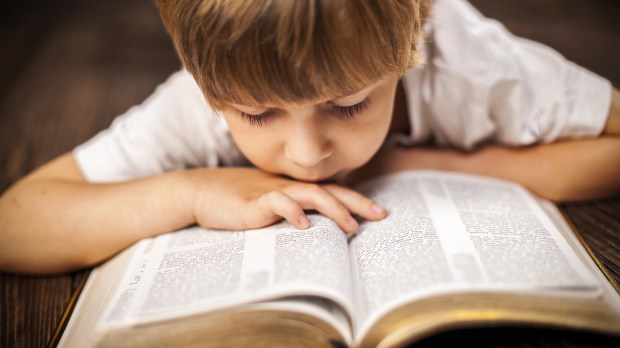The Kentucky Senate passed a bill which would allow the use of the Bible for the study of religion and protect the rights of students to express religious beliefs in public schools. The vote on Friday was 31-3 in favor of the measure. It will now be sent to the Kentucky House of Representatives.
The bill’s text:
AN ACT relating to Bible literacy courses in the public schools. Create a new section of KRS Chapter 156 to require the Kentucky Board of Education to promulgate administrative regulations to establish an elective social studies course on the Hebrew Scriptures, Old Testament of the Bible, the New Testament, or a combination of the Hebrew Scriptures and the New Testament of the Bible; require that the course provide to students knowledge of biblical content, characters, poetry, and narratives that are prerequisites to understanding contemporary society and culture, including literature, art, music, mores, oratory, and public policy; permit students to use various translations of the Bible for the course; amend KRS 158.197 to permit a school council to offer an elective social studies course on the Hebrew Scriptures, Old Testament of the Bible, the New Testament, or a combination of the Hebrew Scriptures and the New Testament of the Bible.
You’ll note there’s no mention of any other religious text being taught. The focus is strictly Judeo-Christian.
Meantime, a priest friend on Facebook would like to remind people of one significant moment in history, the Eliot School rebellion, and says, in effect, “Catholics, beware.”
Some background:
The Eliot School rebellion was a 19th-century incident that played a significant role in the debate over what kind of Christian instruction would be available in American public schools and sparked the establishment of Catholic parochial schools nationwide.The following Sunday at St. Mary’s Parish Sunday School, Whall was among the several hundred boys who heard Father Bernardine Wiget, a Swiss-born Jesuit and an enthusiastic ultramontane, urge them not to recite Protestant prayers lest they fall into “infidelity and heresy.” On Monday, March 14 Shepard again called upon Whall and he again refused. The assistant principal, McLaurin F. Cook,[2] was called. Saying “Here’s a boy that refuses to repeat the Ten Commandments, and I will whip him till he yields if that takes the whole forenoon,” he beat Whall’s hand with a rattan stick for 30 minutes until it was cut and bleeding. The principal then told all boys who intended to refuse to recite the King James version of the commandments to leave the school. One hundred boys left that day. Three hundred left the following day. Some boys reported to school with copies of theVulgate Commandments that they were willing to recite, but they were refused admittance. The incident attracted intense national interest. Charges of assault and battery brought against Cook by the boy’s father were dismissed on the grounds that religious instruction was a proper function of public school teachers. According to historian John McGreevy of the University of Notre Dame, the incident sparked the creation of Catholic parochial schools both in Boston and nationwide. In Boston, St Mary’s Parish created a primary school to educate the boys who had withdrawn from the Eliot School. First called St. Mary’s Institute, and later named in honor of Father Wiget, the school enrolled 1,150 boys in the 1859-60 school year.The incident began on a Monday morning, March 7, 1859. Massachusetts law required that the Ten Commandments be recited in every classroom every morning. Bible passages were also required to be read aloud. On March 7, a teacher at the Eliot School in Boston, Miss Sophia Shepard, called on ten-year-old Thomas J. Whall to recite the Ten Commandments. Whall refused because he was Catholic and Shepard insisted that the Commandments be recited as written in the Protestant King James Bible.

